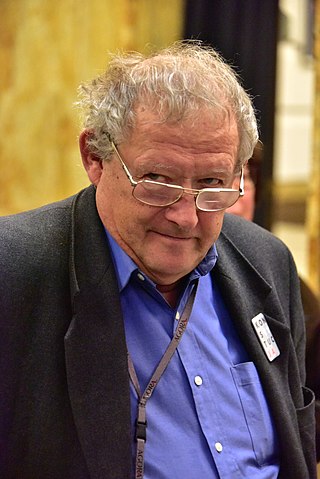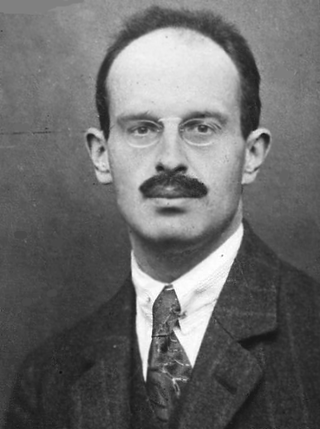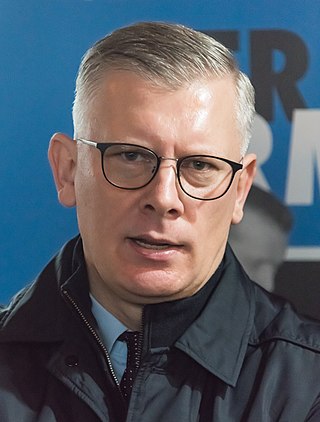
Andrzej Tadeusz Bonawentura Kościuszko was a Polish-Lithuanian military engineer, statesman, and military leader who became a national hero in Poland, the United States, Lithuania, and Belarus. He fought in the Polish–Lithuanian Commonwealth's struggles against Russia and Prussia, and on the U.S. side in the American Revolutionary War. As Supreme Commander of the Polish National Armed Forces, he led the 1794 Kościuszko Uprising.

Adam Michnik is a Polish historian, essayist, former dissident, public intellectual, as well as co-founder and editor-in-chief of the Polish newspaper, Gazeta Wyborcza.

Lech Aleksander Kaczyński was a Polish politician who served as the city mayor of Warsaw from 2002 until 2005, and as President of Poland from 2005 until his death in 2010. Before his tenure as president, he previously served as President of the Supreme Audit Office from 1992 to 1995 and later Minister of Justice and Public Prosecutor General in Jerzy Buzek's cabinet from 2000 until his dismissal in July 2001.

Bronisław Geremek was a Polish social historian and politician. He served as Member of Parliament (1991–2001), Minister of Foreign Affairs (1997–2000), leader of the Freedom Union (2000–2001), as well as Member of the European Parliament (2004–2008).

Mirosława Danuta Wałęsa, is married to the former President of Poland Lech Wałęsa. In 1983 she accepted the Nobel Peace Prize in Oslo, Norway on behalf of her husband, who feared, at a time of great political upheaval in the country, that the Polish government might not allow him to return if he travelled to Oslo himself. Lech and Danuta have been married since 8 November 1969 and have eight children.

Oskar Halecki was a Polish historian, social and Catholic activist. Doctor Honoris Causa of the Polish University Abroad (1973).
The Legislative Gazette is a weekly newspaper covering New York state government and politics located in Albany, New York. Published on Mondays from September through June, the publication bills itself as "The weekly newspaper of the New York state government".
Andrew Nagorski is an American journalist and author who spent more than three decades as a foreign correspondent and editor for Newsweek. From 2008 to April 2014, he was vice-president and director of public policy for the EastWest Institute, an international affairs think tank. Nagorski is based in St. Augustine, Florida. He continues to travel extensively, writing for numerous publications. His most recent book is Saving Freud: The Rescuers Who Brought Him to Freedom, which came out in August 2022.

Thaddeus C. Radzilowski or Thaddeus C. Radzialowski or Tadeusz Radziłowski was a Polish-American historian, scholar, author, professor and co-founder of the Piast Institute, a national institute for Polish and Polish-American affairs. Radzilowski's work focused on Poland and other Central and Eastern European nations, including Russia. He wrote extensively on the histories of these regions as well as the migration of peoples from Central and Eastern Europe, with special emphasis on social history and historiography. He lectured widely in Europe and North America and published more than 100 monographs, edited collections, journal articles, book chapters and scholarly papers.
Maria Siemionow is a Polish transplant surgeon and scientist. She is known for leading a team of eight surgeons through the first near-total face transplant performed in the United States at the Cleveland Clinic in 2008. The patient, Connie Culp, a 45-year-old woman from a small town in Ohio, was exceedingly disfigured by a close range shotgun blast in 2004. The procedure took 22 hours.

Sławomir Cenckiewicz is a Polish historian and journalist.
Kulczyk Investments SA is an international investment company, founded by Polish entrepreneur Jan Kulczyk in 2007, focusing on business opportunities in high-growth markets. The company's strategic sectors are energy, infrastructure, chemical industry and mineral resources. Kulczyk Holding SA is responsible for the operations of the group in Poland.

Lech Wałęsa is a Polish statesman, dissident, and Nobel Peace Prize laureate, who served as the president of Poland between 1990 and 1995. After winning the 1990 election, Wałęsa became the first democratically elected president of Poland since 1926 and the first-ever Polish president elected by popular vote. A shipyard electrician by trade, Wałęsa became the leader of the Solidarity movement, and led a successful pro-democratic effort, which in 1989 ended Communist rule in Poland and ushered in the end of the Cold War.

Walesa: Man of Hope is a 2013 Polish biopic film directed by Andrzej Wajda, starring Robert Więckiewicz as Lech Wałęsa. Wajda stated at Kraków's Off Plus Camera Film Festival in April 2012 that he foresaw trouble following the film's release. The film was selected as the Polish entry for the Best Foreign Language Film at the 86th Academy Awards, but was not nominated.
Fałszywka is a Polish socio-political term describing counterfeit top secret files and fake police reports produced by the Ministry of Public Security in the People's Republic of Poland. Their purpose was to undermine the popularity of prominent opponents of Polish United Workers' Party, mainly by attempting to ruin their good name as private individuals. Fałszywka were used from the beginning of the People's Republic against opponents of the Communist system. These included seemingly stolen or declassified revelations about opposition members working as alleged police informants under the Soviet system. Most notably, some have argued that an entire forged file of this sort was produced in the 1980s and then disseminated by the communist establishment about the leading dissident and future President of Poland Lech Wałęsa when he was nominated for the Nobel Peace Prize. Some politicians claim it was fabricated and then "leaked" to the media in an attempt to prevent Wałęsa from being awarded the Prize.
Tadeusz Kościuszko (1746–1817), a prominent figure in the history of the Polish–Lithuanian Commonwealth and the American Revolution, made several wills, notably one in 1798 stipulating that the proceeds of his American estate be spent on freeing and educating African-American slaves, including those of his friend Thomas Jefferson whom he named as the will's executor. Jefferson refused the executorship and the will was beset by legal complications, including the discovery of later wills. Jefferson's refusal incited discussion in the 19th, 20th, and 21st centuries. Kościuszko returned to Europe in 1798 and lived there until his 1817 death in Switzerland. In the 1850s, what was left of the money in Kościuszko's U.S. trust was turned over by the U.S. Supreme Court to his heirs in Europe.

The European Solidarity Centre is a museum and library in Gdańsk, Poland, devoted to the history of Solidarity, the Polish trade union and civil resistance movement, and other opposition movements of Communist Eastern Europe. It opened on 31 August 2014.
Lech Wałęsa Institute is a non-governmental, non profit organization established in 1995 by Lech Wałęsa, Nobel Peace Prize Laureate and a first democratically elected President of the Republic of Poland.

Ludwika Sosnowska was a Polish aristocrat, who co-translated the first physiocratic work from French to Polish, had an affair with the military engineer Tadeusz Kościuszko but ultimately married Prince Jozef Lubomirski.












